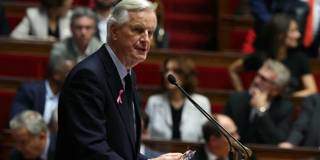
A Weak French Government’s Fiscal Reckoning
Moody’s recent decision to downgrade France’s credit outlook underscores the urgent need to pass a budget that tackles the ballooning deficit. But without a parliamentary majority, Prime Minister Michel Barnier will have to overcome resistance from the left, the right, and within his own centrist coalition.
PARIS – Moody’s recently affirmed France’s credit rating at Aa2 but downgraded its outlook from “stable” to “negative,” highlighting the country’s unsustainable fiscal trajectory. The warning comes amid a fierce parliamentary battle over how to rein in the deficit, which has surged to nearly 6% of GDP – far exceeding all forecasts, including those issued by France’s finance ministry.